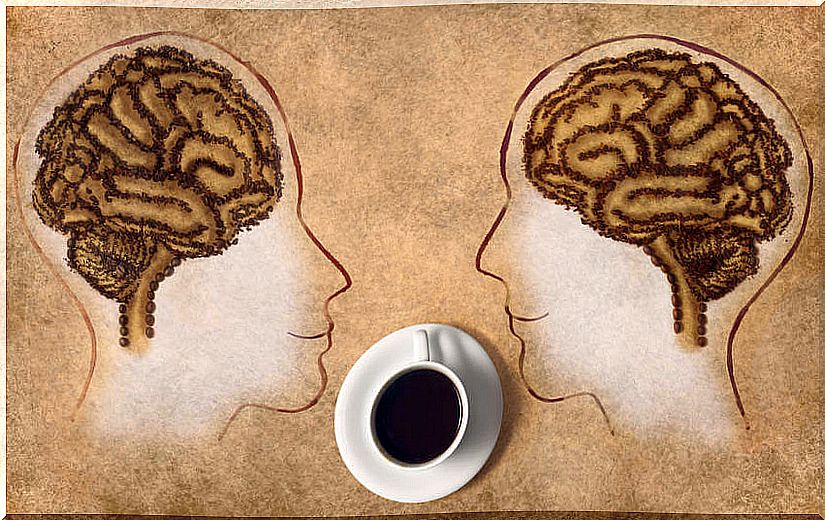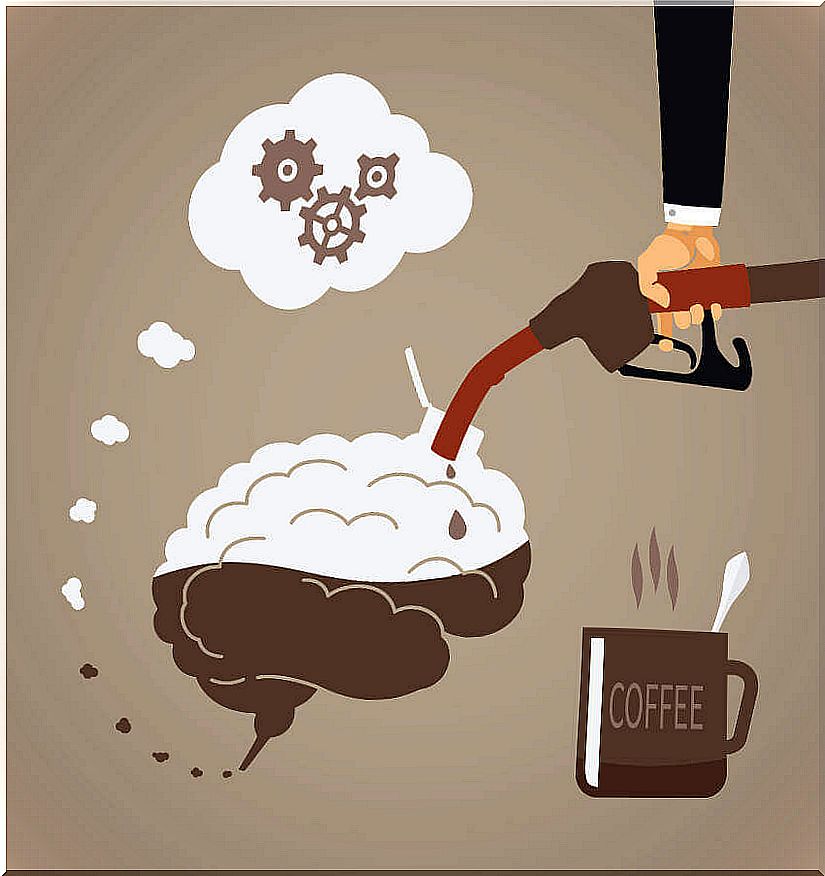Do You Know How Caffeine Helps Our Mind?

Caffeine is a stimulant drug that helps improve mental processing. It is believed to work by blocking adenosine receptors for neurotransmitters, increasing the excitability of the brain. Caffeine also influences other neurotransmitters, including norepinephrine, dopamine, and acetylcholine. These have effects on both mood and mental processing.
Various studies suggest that caffeine helps improve performance in different tasks, such as vigilance, response times and information processing, among others. But this depends on many factors, including the daily consumption of this substance.
One of the big questions that scientists have asked is whether or not these effects of caffeine on mental processes are important for improving memory and, in the long term, preventing degenerative brain diseases, such as Alzheimer’s.
In fact, there is a theory that caffeine consumption during middle age is associated with a lower risk of Alzheimer’s. The fact that caffeine not only helps improve cognitive performance when consumed, but also helps prevent diseases like Alzheimer’s sounds great. For coffee lovers, this is great news.
Studies on caffeine and cognitive performance
According to a recent study conducted at Johns Hopkins University (Baltimore, Maryland, United States), published in 2014, caffeine does help improve memory. The study included 160 male and female participants who were shown a series of images. Five minutes later they were given a 200mg caffeine pill or a placebo.
Twenty-four hours later, the participants who received the caffeine pill showed an improvement in their memory when recalling the images compared to those who received a placebo. According to the researchers, the administration of the pill after showing the images shows that caffeine improves the memory of the participants, rather than other possibilities, even that the improvement was due to increased concentration or focus.
On the other hand, the journal Neuroscience found that when older adults consume caffeine they improve working memory, compared to those who do not consume caffeine.
Another study found that working memory was significantly improved with caffeine consumption, but only in cases where adults who were extroverts. A second study was conducted to replicate this finding. In this case, the researchers found that the recall of series and the memory of those who were extroverts and consumed caffeine improved, but they also found that caffeine helps improve reaction speed and the ability to assimilate new information.
Another study measured the combination of caffeine and glucose and found that when taken together, participants’ reaction time, verbal memory, and attention (concentration) improved compared to those who only drank caffeine or glucose, as well as those who received the placebo.
Another study found that caffeine can also improve spatial memory. This study compared habitual caffeine users to others who consumed it occasionally. The results showed that when both groups consumed caffeine, their ability to make mental maps improved.
Interestingly, those who were regular caffeine users showed less benefit from the dose of caffeine received compared to those who consumed it infrequently.

Which caffeine is the healthiest for the brain?
Another study conducted with women over 65 years of age who had cardiovascular disease and therefore an increased risk of vascular dementia-related cognitive impairment (also called vascular cognitive impairment), measured caffeine intake and performed cognitive assessments at intervals regular over five years to check the relationship between the two.
The results were that women with the highest levels of caffeine consumption, specifically coffee, and not caffeine from cola drinks or tea, performed better on cognitive tests than those who consumed the least caffeine.
In this sense, it is worth highlighting another study in which the effect of caffeine contained in energy drinks (which contain high levels of this substance) on cognitive functioning in young people aged 15 to 18 years was specifically investigated . The researchers found that while these drinks increase wakefulness, participants who drank energy drinks did not show any significant difference in their cognitive function compared to those who drank a placebo.
Studies linking caffeine consumption to Alzheimer’s prevention
A 2009 study in mice found that caffeine not only reversed the presence of Alzheimer’s disease in the brain (including beta-amyloid protein levels), but also reversed memory impairment.
Another 2011 study reported that moderate amounts of coffee provide some protection not only against Alzheimer’s disease, but also cardiovascular disease.
Finally, highlight an investigation published in 2013 in The Journal of Alzheimer’s Disease, in which researchers concluded that rats with dementia experienced a reversal of memory impairment and changes in the brain associated with dementia when caffeine was added to the water they drank.

Caffeine linked to lack of progression of Alzheimer’s disease in people with mild cognitive impairment
Caffeine consumption has also been linked to cognitive stability. People with mild cognitive impairment are at significant risk for Alzheimer’s disease. However, in a study published in the Journal of Alzheimer’s Disease in 2012, researchers reported that they had not found any participants with a high level of caffeine in the blood who had experienced a progression from mild cognitive impairment to Alzheimer’s disease.
Conclusions
Although we have seen a few, there is much more research on caffeine and its effect on memory and other cognitive processes. But, although the results vary significantly from one to another, there does seem to be general support for the idea that caffeine stimulates cognitive functioning. In addition, some research indicates that the source of the caffeine is important, as is the case with coffee.
However, caffeine has many other effects. Caffeine has other benefits, as does coffee, but consuming too much can also have adverse effects. For some people, consuming caffeine, even in low doses, carries health risks.









